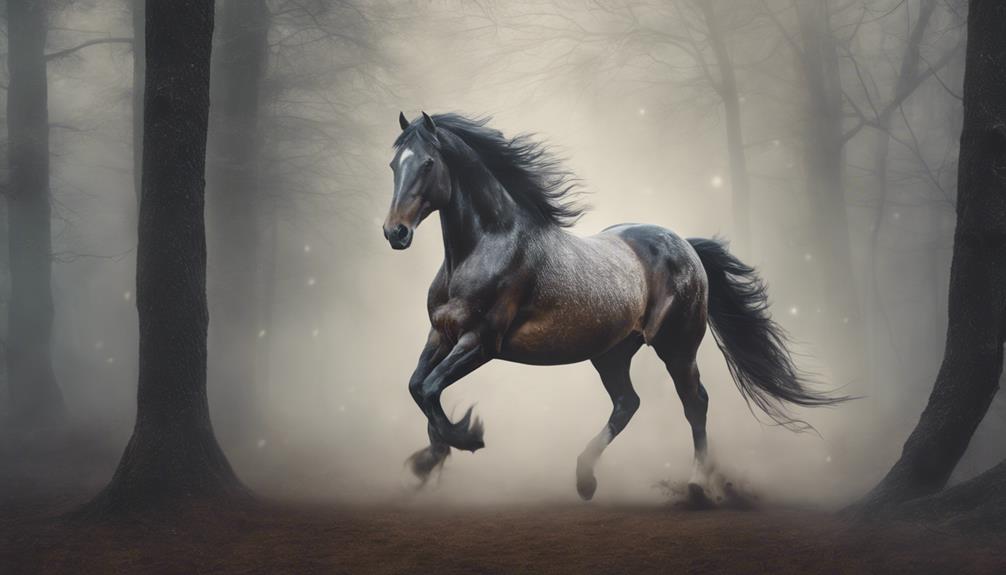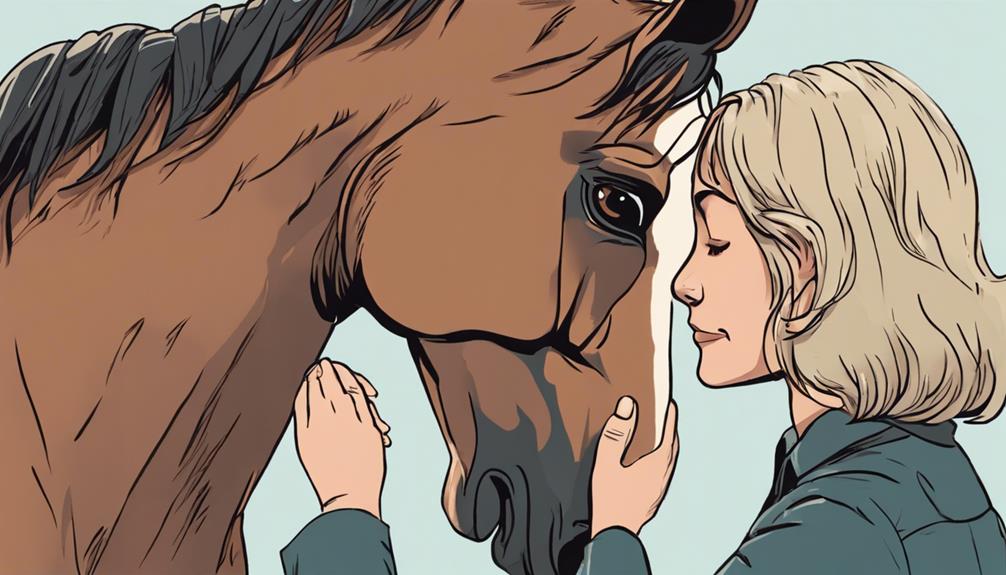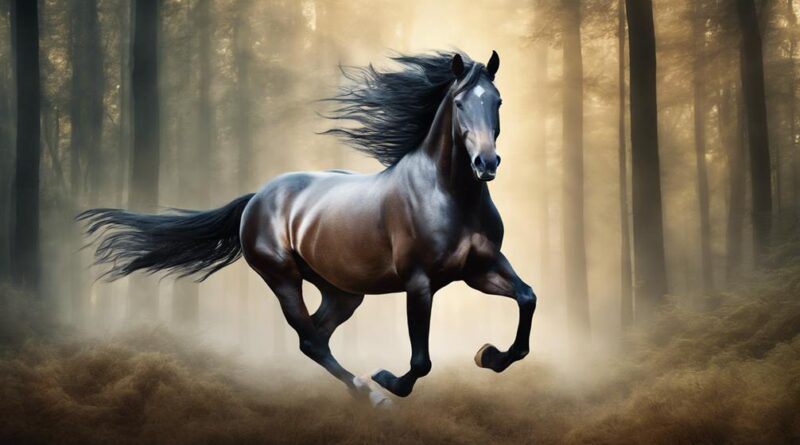Interpreting Horse Symbolism in Popular TV Shows
Imagine the iconic scene in your favorite TV series where a lone horse gallops across the screen, its presence lingering long after the episode ends. Have you ever wondered about the deeper meaning behind such symbolism?
From representing freedom and power to embodying mystery and messages, horses in popular TV shows often carry significant symbolism that adds layers to the narrative. But what exactly do these majestic creatures symbolize, and how does their presence impact the storyline and character development?
Horse Symbolism in Western TV Shows
In Western TV shows, horses often symbolize freedom, strength, and the rugged spirit of the frontier. Cowboys rely on these majestic creatures for transportation, companionship, and assistance in their daily tasks. The deep-rooted connection between cowboys and horses is a central theme in many Western narratives, highlighting the symbiotic relationship between humans and these powerful animals.
Cowboy culture, with its emphasis on independence and resilience, is intricately intertwined with the equine connection portrayed in TV shows. Horses embody the wild and untamed essence of the American West, mirroring the adventurous and daring nature of the cowboys who ride them. The bond between cowboy and horse transcends mere companionship; it represents a harmonious unity between two beings navigating the challenges of a harsh and unpredictable environment.
In Western TV shows, the sight of a lone cowboy riding off into the sunset on horseback has become an iconic image synonymous with freedom and self-reliance. The sound of hoofbeats echoing across vast prairies evokes a sense of nostalgia for a bygone era characterized by bravery and determination. Through their portrayal of cowboy culture and the equine connection, these shows capture the essence of a time when the West was won on the backs of these magnificent creatures.
The Black Stallion: Meaning Unveiled
The symbolism of the Black Stallion delves into deeper layers of meaning beyond just its physical presence in TV shows. This majestic creature often represents more than just a horse; it embodies a variety of symbolic connections and hidden meanings that add depth to its portrayal on screen.
Here are four key aspects to consider when unraveling the symbolic significance of the Black Stallion:
- Power and Strength: The Black Stallion is often depicted as a symbol of raw power and untamed strength, reflecting the idea of overcoming challenges and obstacles with sheer force and determination.
- Freedom and Independence: This iconic horse represents freedom and independence, evoking a sense of liberation from constraints and a longing for autonomy in various narratives.
- Mystery and Intrigue: The Black Stallion's dark coloration often adds an element of mystery and intrigue to its character, hinting at hidden depths and unknown pasts waiting to be revealed.
- Spiritual Symbolism: In some contexts, the Black Stallion can carry spiritual symbolism, embodying themes of transformation, enlightenment, and inner growth that transcend the physical realm.
Wild Horses: Freedom and Power
Wild horses embody the essence of freedom and power in their untamed spirit and majestic presence. These majestic beasts roam the open lands with an untethered grace that captivates all who witness their equine strength. Their wild nature symbolizes the unbridled power that lies within each of us, urging us to embrace our own untamed spirit and break free from societal constraints.
When you watch wild horses galloping across vast meadows or scaling rugged terrains, you can't help but feel a sense of awe at their sheer magnificence. Their flowing mane and strong physique exude a sense of power that's both intimidating and inspiring. It's as if they carry the weight of centuries of untamed history in every stride they take.
As you observe these untamed creatures in their natural habitat, you can learn valuable lessons about the true essence of freedom. Wild horses symbolize the liberation of the soul, encouraging you to tap into your inner strength and embrace your individuality without fear. Their presence reminds you that true power comes from within, and that embracing your wild side can lead to a life filled with authenticity and purpose. So, the next time you see a wild horse running free, remember the untamed spirit that resides within you, waiting to be unleashed.
The White Horse: Purity and Light
Galloping amidst a field bathed in the glow of dawn, the white horse embodies purity and light with every graceful step. Its pristine coat glistens like freshly fallen snow under the morning sun, exuding an aura of purity that captivates all who behold its splendor. The symbolism of the white horse in popular TV shows often carries deep meaning, reflecting themes of innocence, enlightenment, and hope.
Here are four ways the white horse represents purity and lightness in TV narratives:
- Symbol of Innocence: The white horse is frequently portrayed as a symbol of innocence and purity, highlighting the untarnished nature of its character or the world it inhabits.
- Messenger of Light: In many TV shows, the white horse serves as a messenger of light, guiding characters towards enlightenment, truth, or spiritual awakening.
- Beacon of Hope: As a creature associated with purity, the white horse often symbolizes hope in the face of adversity, offering a sense of optimism and renewal.
- Spiritual Connection: The presence of the white horse can signify a spiritual connection or awakening, leading characters on a journey of self-discovery and transformation.
In essence, the white horse in TV symbolism represents a beacon of purity and lightness, weaving a tapestry of themes that resonate with audiences seeking solace and inspiration in the narratives they follow.
Horse as a Messenger in TV

Elegantly trotting across screens, horses often serve as messengers in TV shows, conveying important messages and propelling the plot forward. Their presence goes beyond mere transportation; it signifies a spiritual connection and offers divine guidance to characters in various storylines. In many cultures, horses have been revered for their role as messengers, carrying ancient symbolism and embodying the idea of a mystical messenger sent to deliver crucial information.
In shows like 'Game of Thrones,' horses are depicted as bearers of news, linking different characters and story arcs. The sight of a horse galloping into a scene often heralds significant developments or imminent danger, emphasizing the mystical nature of these creatures in the narrative. This portrayal harkens back to historical contexts where horses were used to deliver urgent messages across vast distances, highlighting their role as conduits of essential information.
The depiction of horses as messengers also serves to underscore the idea of interconnectedness and the unseen forces guiding characters' paths. Whether it's a lone rider on horseback delivering a crucial message or a mystical horse appearing in dreams to impart wisdom, the symbolism of horses as messengers adds depth and intrigue to TV shows, weaving a thread of divine intervention throughout the storyline.
The Dark Horse: Symbol of Mystery
Unveiling an aura of enigmatic allure, the dark horse emerges as a symbol shrouded in mystery within TV shows. Its deep, ebony coat and penetrating gaze create an enigmatic presence that captivates viewers and adds layers of intrigue to the storyline.
Here are four ways the dark horse symbolizes mystery in TV shows:
- Symbol of Unpredictability: The dark horse often represents unpredictability and the unknown. Its mysterious allure adds a sense of suspense and keeps viewers on the edge of their seats, wondering what unexpected twist it may bring to the plot.
- Agent of Transformation: In many TV shows, the dark horse serves as an agent of transformation. Its enigmatic presence sparks change and growth in other characters, leading to unexpected developments and revelations.
- Bearer of Secrets: The dark horse is often depicted as a keeper of secrets. Its mysterious allure hints at hidden knowledge and untold truths, drawing characters and viewers alike into its enigmatic world of mystery.
- Harbinger of Destiny: Within the realm of TV symbolism, the dark horse is sometimes seen as a harbinger of destiny. Its enigmatic presence foreshadows significant events and signals a shift in the characters' fates, adding a sense of foreboding and excitement to the narrative.
Horse Bonding in TV Series

In TV series, the bond between horses and characters often reveals a deep connection that transcends words. This connection goes beyond mere companionship; it delves into realms of emotional healing and understanding through equine therapy. Horses, known for their intuitive nature, play a significant role in helping characters navigate their inner struggles and find solace in their presence.
Through interactions with horses, characters learn valuable communication skills akin to those taught by a horse whisperer. The silent yet profound exchanges between the characters and these majestic animals serve as a pathway for emotional growth and self-discovery. The horses become more than just animals; they become companions in the characters' journeys towards healing and self-awareness.
Equine therapy portrayed in TV series often highlights the transformative power of the human-horse bond. Characters find solace in the non-judgmental nature of horses, allowing them to express emotions they may struggle to articulate otherwise. Watching these relationships unfold on screen serves as a reminder of the profound impact animals can have on our lives, offering a unique form of therapy that words often can't provide.
Horse Symbolism in Modern Drama
Horses in modern drama serve as powerful symbols, conveying deeper meanings and themes through their presence and interactions with characters. In today's TV shows, horses aren't merely animals; they're laden with symbolic significance, enriching the narrative in various ways. Here's a modern interpretation of horse symbolism in contemporary drama:
- Freedom and Liberation: Horses often represent freedom in modern drama, symbolizing characters' desire to break free from constraints or oppressive situations. Their majestic presence embodies the yearning for liberation and the pursuit of independence.
- Strength and Power: In modern drama, horses are frequently used to symbolize strength and power. Their robust physique and untamed nature mirror the inner strength and resilience of characters facing challenges or adversities.
- Connection with Nature: Horses serve as a bridge between characters and the natural world in modern interpretations. Their presence fosters a connection with nature, highlighting the characters' harmony with the environment and their primal instincts.
- Journey and Transformation: Symbolizing journeys and transformations, horses in modern drama often accompany characters on significant quests or personal growth arcs. Their roles reflect the transformative experiences and profound changes that characters undergo throughout the narrative.
Frequently Asked Questions
How Did Horses First Come to Be Associated With Symbolism in Popular TV Shows?
When horses became intertwined with symbolism in popular TV shows, their origin can be traced back to their majestic presence and historical significance.
The evolution of this association has deepened over time, reflecting themes of strength, freedom, and power.
The impact of horses in these shows is significant, adding layers of meaning and enhancing storytelling.
Their symbolism resonates with audiences, creating a lasting impression and emotional connection.
Are There Any Specific Breeds of Horses That Are Commonly Used to Convey Certain Symbolic Meanings in TV Shows?
In TV shows, certain horse breeds often symbolize specific traits or themes. For example, the majestic Arabian breed is commonly associated with grace and elegance, while the sturdy Clydesdale represents strength and reliability.
Color plays a role too; white horses can symbolize purity or innocence, while black horses are often linked to mystery or power.
These popular interpretations are influenced by cultural beliefs and historical associations.
What Role Does the Color of a Horse Play in Its Symbolism in TV Shows?
When it comes to equine representation in TV shows, the color of a horse holds significant meaning. Color symbolism plays a crucial role in conveying the symbolic significance of the equine hue.
Different colors can represent various traits or emotions, adding depth to the character or theme associated with the horse. Understanding the symbolic implications of horse colors can enhance the storytelling and evoke specific feelings in the audience.
Are There Any Cultural or Historical Influences That Have Shaped the Way Horses Are Portrayed Symbolically in Popular TV Shows?
Cultural and historical influences have significantly shaped the symbolic portrayal of horses in popular TV shows. These elements have played a crucial role in defining the meaning and accuracy of how horses are depicted on screen.
How Do TV Show Creators Work With Horse Trainers and Handlers to Ensure That the Symbolic Message of a Horse Is Accurately Conveyed on Screen?
When creating TV shows, creators work closely with horse trainers and handlers to ensure the symbolic message of a horse is accurately portrayed on screen. By collaborating, they can incorporate specific training techniques that enhance the horse's performance and the symbolic representation intended.
This process aims to deliver an authentic portrayal of the horse's role in the storyline, adding depth and meaning to the overall narrative.
Conclusion
As you watch popular TV shows, pay attention to the symbolism of horses. From representing freedom and power to mystery and purity, these majestic creatures play a significant role in storytelling.
Whether it's a black stallion leading the way or a white horse symbolizing light, the presence of horses in TV series adds depth and meaning to the narratives.
Keep an eye out for these symbolic representations as you immerse yourself in the world of television.
